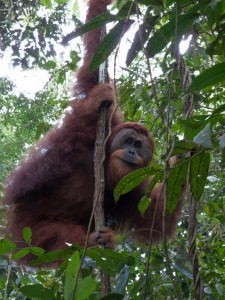In a major step forward for global climate and human rights, paper giant Asia Pulp & Paper (APP) has promised to stop bulldozing Indonesia’s rainforests. Indonesia is the third largest greenhouse gas-emitting country in the world.
 The announcement came on February 5, 2013, after Global Greengrants Fund partner Rainforest Action Network (RAN) and other international organizations launched campaigns that forced dozens of high-profile companies to sever contracts with APP. But in attributing APP’s new policy solely to market pressure, U.S. media such as The New York Times, The Christian Science Monitor, and Mother Jones have omitted the role grassroots activists have and will continue to play in holding APP accountable for its environmental and human rights record.
The announcement came on February 5, 2013, after Global Greengrants Fund partner Rainforest Action Network (RAN) and other international organizations launched campaigns that forced dozens of high-profile companies to sever contracts with APP. But in attributing APP’s new policy solely to market pressure, U.S. media such as The New York Times, The Christian Science Monitor, and Mother Jones have omitted the role grassroots activists have and will continue to play in holding APP accountable for its environmental and human rights record.
“Local people in Sumatra and Kalimantan have been fighting back against land grabs that are causing social conflicts and human rights abuses,” says Lafcadio Cortesi, a Global Greengrants Fund advisor and Asia Director for RAN. “That’s the story that’s not being told. A challenge area will be in monitoring and pressuring the company to continue its commitments. That’s where there will be a huge need for the kind of support Global Greengrants Fund is uniquely positioned to provide.”
In one community, where logging displaced dozens of families and police shot and killed a community activist, Global Greengrants Fund partnered with RAN to support the farmers’ struggle to recover their land. Another local group used a Global Greengrants Fund grant to study logging and identify areas most in need of protection. The study results helped communities make a desperate case for national and international help resisting forest destruction.
“These conflicts have risen to the government level and are putting a spotlight on problems with the pulp and paper industry,” Cortesi says. “So while the company has paid a lot of attention to market pressures, the government of Indonesia has paid more attention to social conflict. And those social issues will be a huge legacy the company will have to deal with over the next five to ten years.”
RAN is quick to point out that APP’s new commitment is the starting point, not the finish line.
“One of the problems with this announcement is that it doesn’t specifically address how APP is going to resolve social conflict,” Cortesi says. “They’re operating 2.5 million hectares of real estate, and a good chunk of that is what I would consider stolen land. Grassroots work will be critical in monitoring agreements,” Cortesi says. “Local people on the ground are the ones looking at the logging trucks rolling in and the excavators rolling out.”
Clearing Indonesia’s rainforest has global impacts: logging has contributed to making Indonesia the third largest greenhouse gas-emitting country in the world, after the United States and China. APP alone has already deforested an area the size of Massachusetts, putting the last surviving populations of Sumatran elephants, tigers, and orangutans at risk of extinction.
In fact, this isn’t the first time APP has promised reforms to its environmental and human rights policies. The paper giant has a long history of broken promises when it comes to human rights and land conflicts. This puts added pressure on local grassroots groups to monitor and expose environmental or human rights violations.
Still, the milestone new policy offers a powerful lesson: collaboration creates change. When global environmental organizations and grassroots groups join together, they can hold even the largest companies working in the world’s most remote environments accountable for their impact on the planet and its people. Leveraging the economic power of the West was critical in pressuring APP to change its policies—but so was supporting the tactics, strategies, and leadership of communities working at the grassroots level.
Thank you to our partners, to our donors, and to community members in Indonesia for advocating for our climate and the people and wildlife of Indonesia.
